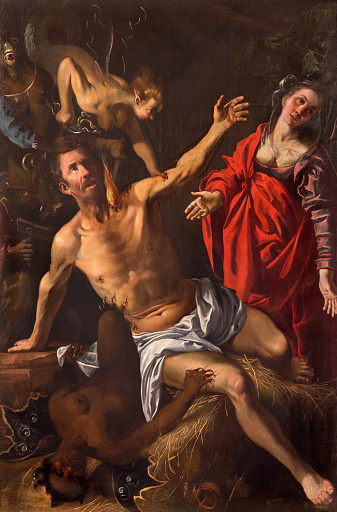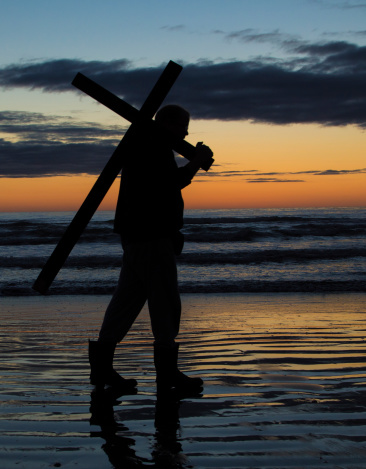All
The most recent articles, videos, blog entries, and more that have been added to ChristianUnion.org.
A Prayer and Fasting Devotional
 I find myself coming back time and again to the temptations of Jesus in the Gospel of Matthew. Recently I've been struck anew by the strange, counterintuitive opening line of the story: "Then Jesus was led up by the Spirit into the wilderness to be tempted by the devil." (4:1)
I find myself coming back time and again to the temptations of Jesus in the Gospel of Matthew. Recently I've been struck anew by the strange, counterintuitive opening line of the story: "Then Jesus was led up by the Spirit into the wilderness to be tempted by the devil." (4:1)Led by the Spirit (God's presence, in line with His purposes)...into the wilderness (the place of emptiness, misery, loneliness, hardship, where God seems far from our experience)...to be tempted by the devil (exposed to dehumanizing evil). These are not realities we usually associate together. In the center of God's will, in the center of the storm, overwhelmed by the contrast between my experience and desires and God's (purported, but now called increasingly into question) will.
A Prayer and Fasting Devotional
 Why do you pass judgment on your brother? Or you, why do you despise your brother? For we will all stand before the judgment seat of God; for it is written, “As I live, says the Lord, every knee shall bow to me, and every tongue shall confess to God.” So then each of us will give an account of himself to God. - Romans 14:10-12
Why do you pass judgment on your brother? Or you, why do you despise your brother? For we will all stand before the judgment seat of God; for it is written, “As I live, says the Lord, every knee shall bow to me, and every tongue shall confess to God.” So then each of us will give an account of himself to God. - Romans 14:10-12A Prayer and Fasting Devotional
 A wise person said, “The greatest battles you will ever fight happen in bed alone in the dark.” King David (the boy who killed Goliath and the warrior who took down tens of thousands of Israel’s enemies) composed Psalm 4 in the throes of just such a battle—alone in the dark at night.
A wise person said, “The greatest battles you will ever fight happen in bed alone in the dark.” King David (the boy who killed Goliath and the warrior who took down tens of thousands of Israel’s enemies) composed Psalm 4 in the throes of just such a battle—alone in the dark at night. A glance at the final stanza reveals who is ultimately the Victor: “I will lie down and sleep peacefully, for you, Lord, make me safe and secure.” But how does David go from crying out in the middle of the night, like so many of us, to resting in God? What can you and I learn from Psalm 4 as we wrestle with anxieties and temptations through this fast?
1. David cries out to God:
When I call out, answer me,
O God who vindicates me!
Though I am hemmed in, you will lead me into a wide, open place.
Have mercy on me and respond to my prayer!
A Prayer and Fasting Devotional
 It’s no secret that we live in an individualistic culture. That’s not all bad. It’s right and biblical to value individual human beings as endowed with dignity because they are created in the image of God. It’s good to hold individuals accountable for their actions. And we should, as Christians, keep teaching that individuals must be born again if they are to enter the Kingdom of God.
It’s no secret that we live in an individualistic culture. That’s not all bad. It’s right and biblical to value individual human beings as endowed with dignity because they are created in the image of God. It’s good to hold individuals accountable for their actions. And we should, as Christians, keep teaching that individuals must be born again if they are to enter the Kingdom of God. But the extreme individualism of American culture has its pitfalls, too. Millions of families are broken because fathers and mothers have exalted personal autonomy and happiness to godlike status. Communities decay when its members ignore the common good. Workplaces become oppressive when the boss abuses power for his own benefit at the expense of his employees.
What is the true meaning of the term reconciliation? Former Princeton Ministry Fellow Scott Jones discusses who is responsible for and how to go about true Christian reconciliation. (40:01)
A Prayer and Fasting Devotional
 "Our Lord Jesus wants our joy to be full. Certainly, he has made abundant provision for our joy. And if we focus our minds on the facts from which joy flows, springs of joy will well up in our hearts every day of our lives; and this will turn our ongoing pilgrimage through this world into an experience of contentment and exaltation of which the world knows nothing" (J. I. Packer, God’s Plans for You, 125).
"Our Lord Jesus wants our joy to be full. Certainly, he has made abundant provision for our joy. And if we focus our minds on the facts from which joy flows, springs of joy will well up in our hearts every day of our lives; and this will turn our ongoing pilgrimage through this world into an experience of contentment and exaltation of which the world knows nothing" (J. I. Packer, God’s Plans for You, 125).A Prayer and Fasting Devotional
 I walked down the street, knowing I had been given exactly what I needed. No more, no less. I was thankful, but uneasiness began to chip away at the surface level of gratefulness.
I walked down the street, knowing I had been given exactly what I needed. No more, no less. I was thankful, but uneasiness began to chip away at the surface level of gratefulness.That’s when I realized I didn’t actually want God to provide for me; I wanted Him to make me comfortable. I didn’t want enough to cover this specific need. I wanted enough that I would never have to rely on the help of others again. I said I relied on God, but I really just wanted to make ends meet on my own terms. I didn’t want other people to be involved.
A Prayer and Fasting Devotional
 “Remember Jesus Christ, risen from the dead, the offspring of David, as preached in my gospel, for which I am suffering, bound with chains as a criminal. But the word of God is not bound! Therefore I endure everything for the sake of the elect, that they also may obtain the salvation that is in Christ Jesus with eternal glory.” - 2 Timothy 2:8-10
“Remember Jesus Christ, risen from the dead, the offspring of David, as preached in my gospel, for which I am suffering, bound with chains as a criminal. But the word of God is not bound! Therefore I endure everything for the sake of the elect, that they also may obtain the salvation that is in Christ Jesus with eternal glory.” - 2 Timothy 2:8-10When you are weighed down by life, do you lack the courage to trust the Word of God? In the midst of struggles, do you need to be reminded that it is the power of the Gospel that changes peoples’ lives and makes a difference even in the darkest of circumstances? A godly older woman in my life, who is a great help to me when I face discouragement, will ask me, “Where are your eyes right now, Lisa?” My answer is often, sheepishly, “On me, and on my circumstances.” To which she gently replies, “And where should they be?” She and I both know that the best place for us to have our eyes is on the Lord.
A Prayer and Fasting Devotional

In Eliezer Diamond’s thorough treatment of fasting in rabbinic Judaism (Holy Men and Hunger Artists, Oxford Press, 2004), he traces two different yet important ways of understanding and approaching devotional self-discipline. First, Diamond defines “essential asceticism” as entailing “explicit renunciation of some aspect of conventional existence because the self-denial itself is seen as inherently spiritually salutary” (12). Alternatively, this is contrasted with what Diamond defines as “instrumental asceticism,” those practices that necessitate a “commitment to a spiritual quest so consuming that one feels it necessary to minimize or eliminate worldly pursuits and pleasures because they detract from or distract one from one’s godly objectives.”
A Prayer and Fasting Devotional
 "In him was life, and the life was the light of men. The light shines in the darkness, and the darkness has not overcome it." - John 1:4-5
"In him was life, and the life was the light of men. The light shines in the darkness, and the darkness has not overcome it." - John 1:4-5 Looking at the world in which we live, we can easily become overwhelmed. Overwhelmed by evil, pain, sadness, frustration, and fear. So many things in this world cause us to ask, "Why, Lord?" and "How long?" And, truthfully, the broken things in a big, bad world aren’t just a distant reality. We see it in our lives; hear echoes of it in our thoughts. There is sin and brokenness all around us and in us. Thankfully the true and good news of the Gospel rushes into view, and light undoes the darkness. Jesus Christ came into the world to save sinners and to redeem a broken world. He came to be a light and undo the darkness around us. He is light, and in His resurrection He beat sin, death, and hell. His light brings with it life. There is eternal life with God forever and a new life in this world to which He has called us.
eNews
Subscribe Today
Subscribe Today
Sharpen your worldview via our biweekly eNewsletter containing great articles (from CU and around the web).





